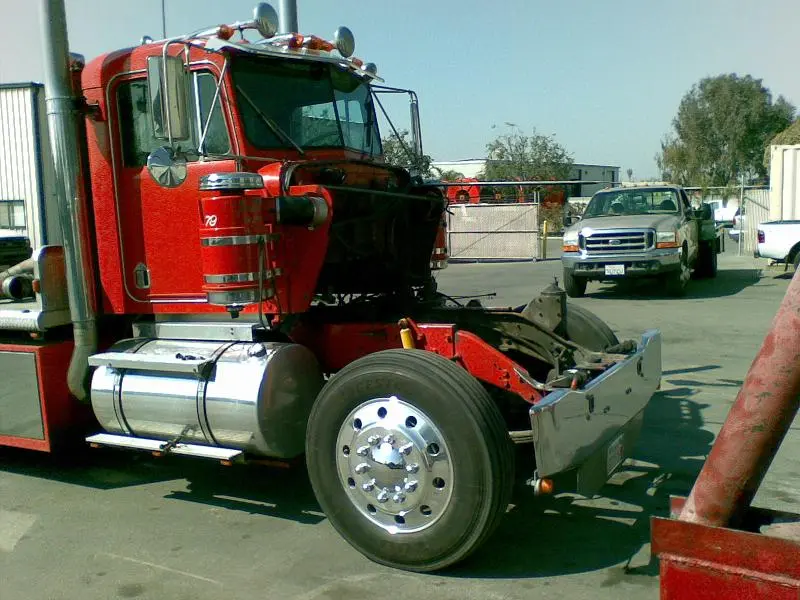There are two things right off hand to check and with it idling take a 3/4" open end wrench and open each fuel line one at a time till fuel comes out and see if one of them takes the knock away when it,s open and if it goes away sounds like a bad nozzle. You could swap that nozzle with another one in the engine and see if the knock follows and if so pretty much pins it down to a bad nozzle. If the knock is still there take the oil filters out and see if they have some aluminum grindings or chips caught in them and if so sounds like you got trouble there, scored bearing or bearings.
Sorry, I didn't explain myself well. I am asking what knock sounds like. I don't hear anything. The engine sounds normal to me - just like the other motor grader I have that runs fine. I was only told that the engine has knock when I bought it, but I don't know that for myself.
There are many faint knocks and clatters from a engine that's running, and the noise is worse when they are cold. "Diesel knock" is the explosive combustion of diesel fuel under high compression that is readily identifiable with any diesel.
However, audible knocks can be caused by excessive clearances or faulty fuel injection. Clearances larger than normal in (mostly) big end bearings will come across, as a louder-than-normal regular deep knock. The knock is audible above the regular "diesel knock" and generally increases at higher speed, and when the engine RPM is varied slightly but rapidly (the vroom-vroom of rapid throttle increase and decrease).
Another source of knock is excessive wrist pin clearance. This is generally louder but lighter in pitch than a big end bearing, and is regular through the rev range and throttle application. A mechanics stethoscope is an ideal tool to try and pinpoint knocks.
Have someone operate the throttle, varying the RPM, while you place the stethoscope on the lower parts and upper parts of the engine block, to try and pinpoint the sound source area. Check at idle, and check at higher RPM.
Injection knock is a very loud knock that is alarming, and easily heard. It is caused when air gets into the fuel, or the injectors are faulty, and not atomising the fuel properly. Injection knock can be found easily by utilising the process described above by SJ.

Raklet, click on the links below. I got piston and rod knocking video's. Then a picture of whats next 😮
#6 Piston Knock,
http://www.youtube.com/watch?v=c2_k4QvQmPw
http://www.youtube.com/watch?v=Hg7MiHwFDIw
#2 Rod Knock,
http://www.youtube.com/watch?v=9ks9T6cPxxI
http://www.youtube.com/watch?v=GVNLx0UsVzE
I think the camera is shaking because I'm crying LoL
Raklet, click on the links below. I got piston and rod knocking video's. Then a picture of whats next 😮
#6 Piston Knock,
http://www.youtube.com/watch?v=c2_k4QvQmPw
http://www.youtube.com/watch?v=Hg7MiHwFDIw
#2 Rod Knock,
http://www.youtube.com/watch?v=9ks9T6cPxxI
http://www.youtube.com/watch?v=GVNLx0UsVzE
I think the camera is shaking because I'm crying LoL
[quote="Mike Mc"]Raklet, click on the links below. I got piston and rod knocking video's. Then a picture of whats next 😮
[/quote]
😮 That rod knock video is terrible! I don't have anything that sounds like that.
Mike, got a little over rev going on there to cause that or or pulling too hard with the 8 on.
There are many faint knocks and clatters from a engine that's running, and the noise is worse when they are cold. "Diesel knock" is the explosive combustion of diesel fuel under high compression that is readily identifiable with any diesel.
However, audible knocks can be caused by excessive clearances or faulty fuel injection. Clearances larger than normal in (mostly) big end bearings will come across, as a louder-than-normal regular deep knock. The knock is audible above the regular "diesel knock" and generally increases at higher speed, and when the engine RPM is varied slightly but rapidly (the vroom-vroom of rapid throttle increase and decrease).
Another source of knock is excessive wrist pin clearance. This is generally louder but lighter in pitch than a big end bearing, and is regular through the rev range and throttle application. A mechanics stethoscope is an ideal tool to try and pinpoint knocks.
Have someone operate the throttle, varying the RPM, while you place the stethoscope on the lower parts and upper parts of the engine block, to try and pinpoint the sound source area. Check at idle, and check at higher RPM.
Injection knock is a very loud knock that is alarming, and easily heard. It is caused when air gets into the fuel, or the injectors are faulty, and not atomising the fuel properly. Injection knock can be found easily by utilising the process described above by SJ.
Ok, opinion time.
I found a local old gent that has 40+ plus years working on CATS. He came out and listened to the engine with me. He couldn't hear anything right off and had it run for several minutes to get good and warm, still with nothing apparent showing up. He told me to get the tires fixed so I could take it out and put a load on it.
We were about to shut it down when he messed with the throttle linkage. Finally, we could hear some noise. It occurs when the throttle is rapidly moved from high rpms to low rpms. The noise is not audible going from low rpms to high rpms. We cracked each of the fuel lines, but no change there. The noise can still be heard, but not at any steady rpm level. Only when the engine is retarded from high rpm to low.
The old gent suggested I remove the inspection covers and check to make sure the rods are tight and inspect the bearings. I guess that will be my next step. Also I am going to change the oil filters and look for metal shavings. Any other opinions, suggestions?
Thanks